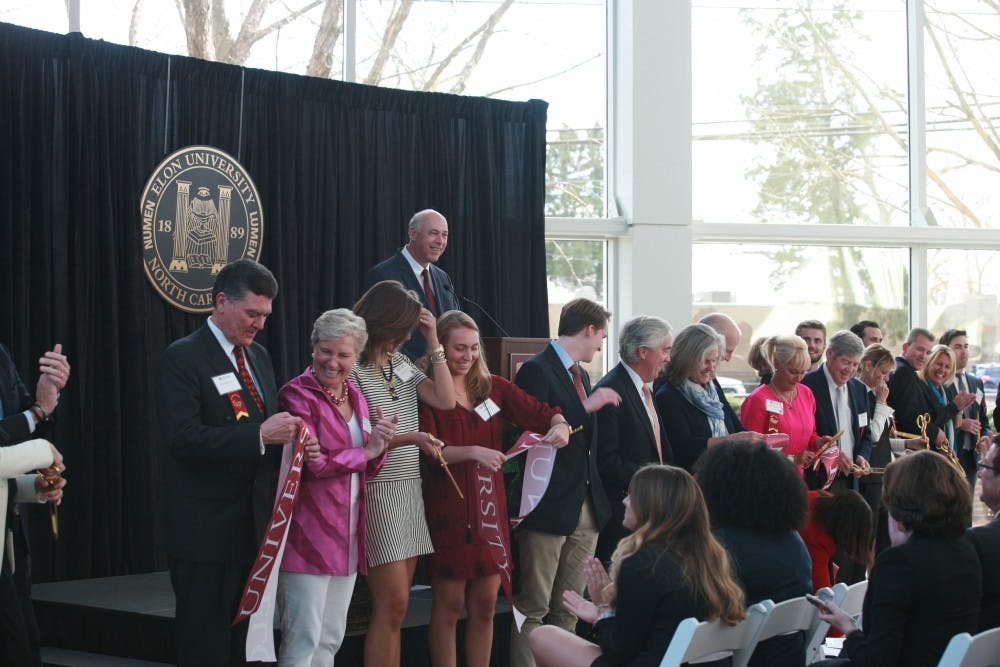After the founding Dean of the School of Communications, Paul Parsons, announced the was stepping down, the Elon University community was left wondering what the search for his replacement would entail.
Since Parsons has been with the School of Communications, it has become both a nationally recognized and accredited school.
“We’re one of 18 private universities with an accredited communications school,” Parsons said. “We just went through our third accreditation review last week. I knew I wanted to go through that before I would announce that I would be stepping down as dean.”
In addition to the achievement of accreditation, Parsons’ other accomplishments during his time include the creation of new programs in the school such as Live Oak Communications, Elon Docs and Maroon Sports.
“We’ve created this package for our students that we think will prepare them well for whatever [their] job titles are in the future,” Parsons said.
Jessica Gisclair, chair of the department of communications, commends Parsons’ legacy at the school.
“Dean Parsons has built a wonderful reputation of being a collaborator,” Gisclair said. “He is very open about sharing his rationale, and he solicits our opinions about those rationales. I’m hoping that kind of transparency and open dialogue continues.”
Parsons agrees that transparency and dialogue are key attributes to a successful dean, alongside other characteristics.
“A dean is a leader who works with the faculty collectively to make good things happen,” Parsons said. “I think that what was a positive during my time as dean was to align the School of Communications with the aspirations of the university.”
Provost Steven House will be commencing the open search for a new dean.
“I’ve consulted with President Lambert, president-elect Book and I’ve sent names to the academic council,” House said. “They are going to give me their feedback, and some time next week I will invite each individual to be on the search committee.”
After the search committee is assembled, they will write a prospectus describing Elon University, the School of Communications and the attributes they are searching for.
House hopes the search will be conducted immediately after the committee is chosen, continue through spring semester, have a chosen candidate announced by April 1, 2018 and the new dean begin June 1, 2018.
Parsons, having been the founding dean, is leaving big shoes to fill in the eyes of faculty and staff.
“We’re looking for someone who would be able to continue his legacy,” House said. “We’re looking for someone who will be able to keep Elon as one of the top schools of communications in the country, keep it accredited and work with its board members — it’s a big job.”
Gisclair hopes to find someone who has a strong leadership role in academia, and will challenge and continually improve the faculty. The concept of leadership as a dean incorporates a great deal of responsibility and poise.
“In order to lead you have to have the ability to listen, the ability to take those opinions that you receive and make it part of the greater good for everyone,” Gisclair said.
Echoing the concept of collaborative leadership, Parsons is on the same page as other faculty members. “People do want leadership, but they want it to be participatory leadership,” he said. “A wise dean understands that and works with people to make good things happen.”
This search for a collaborative leader will be a national search.
Challenges that are unique to the School of Communications include the continuous changes and advancements of the communications world outside of Elon, and what that means for students currently in the program.
“The curriculum will always be a challenge,” Parsons said. “Our world of communications is changing so rapidly that it’s almost as if we have to keep talking about what the students need for the communications environment that we anticipate four years from now.”
In addition to a changing curriculum, Gisclair anticipates an overall change in the student body.
“The educational systems across the United States are really going to have a smaller pool of applicants potentially in the future because we don’t have enough students who will be going to college,” Gisclair said.
With a potentially smaller pool of applicants, Gisclair believes there will be effects that the dean will need to anticipate.
“The way we position ourselves as a School of Communications that is accredited is going to make a big difference in drawing the attention of students who want to major in one of our five majors,” Gisclair said.
Parsons also anticipates challenges and changes accompanying a possible restructuring of faculty within the school.
“The school, interestingly enough, has not yet had a faculty retirement,” Parsons said. “After seventeen years without a retirement, I suspect we will start having retirements in the next five years.”
Future faculty retirements will also mean a change in dynamic.
“When that happens, the new dean will have an opportunity to shape the faculty [and] the ability to address new curriculum areas that may be emerging,” Parsons said.
Overall, the search for a new dean will be a meticulous investigation to fill the legacy that Parsons will leave behind.
“I deeply appreciate what Paul Parsons did for the university and the college,” House said. “We are a unique institution and are looking for people that will continue to make us unique and excellent.”


